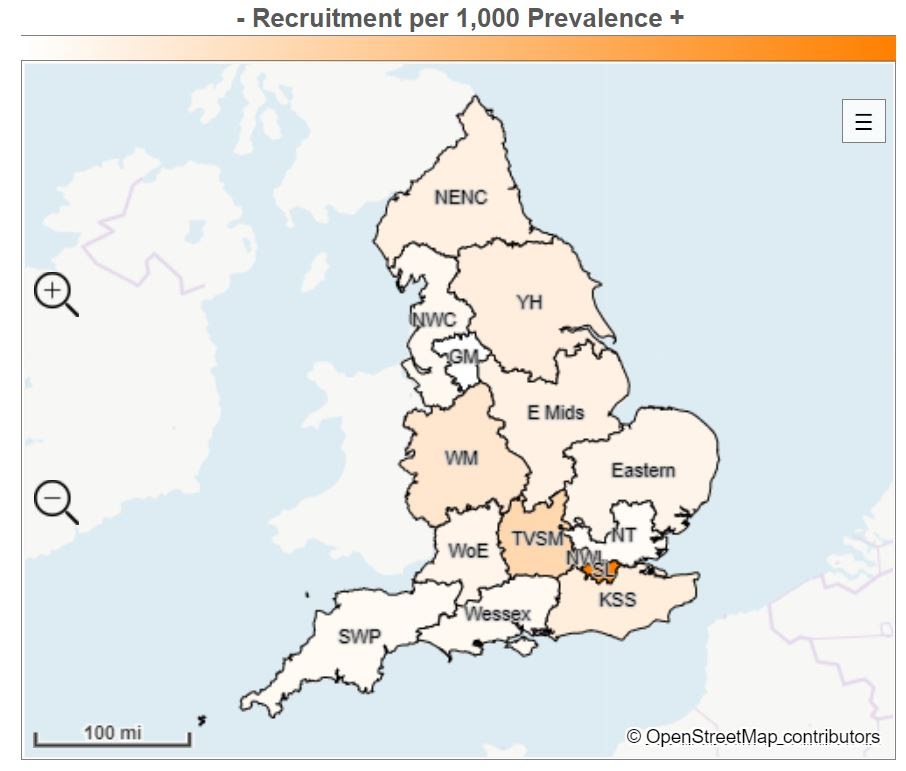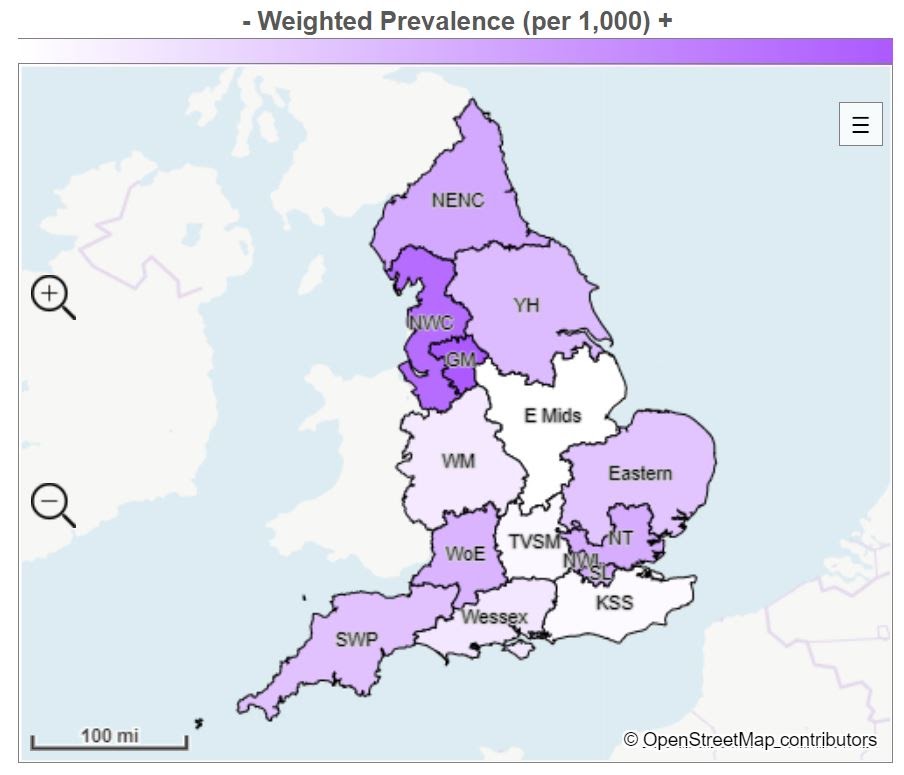Introduction
The NIHR Programme Development Grants (PDG) programme invites proposals to address the challenge of mental health. We are particularly interested in applications that include populations and communities with high disease burden, have been historically underserved by research activity, and address equality diversity and inclusion.
The scope of the call is limited to diagnosable mental health conditions within the Health Research Classification System (HRCS) mental health category, including depression, schizophrenia, psychosis and personality disorders, addiction, suicide, anxiety, eating disorders, learning disabilities, bipolar disorder, autistic spectrum disorders and studies of normal psychology, cognitive function and behaviour. Research addressing an alternate HRCS code (such as the HRCS neurological category, which includes dementia) are out of scope for this call.
Whilst the call is open to any research within the scope above, PDG would particularly welcome applications which:
- Demonstrate innovative and creative approaches or methodologies, with outcomes that can capture the range and breadth of individuals’ experiences within mental health. Applicants are encouraged to incorporate a less risk-averse approach than is traditionally stipulated for this funding stream.
- Provide opportunities for building teams across health, social care and charitable sectors, alongside high-quality collaborations between multiple agencies. Particular interest is placed on proposals involving practitioners that are currently under-represented in our programmes, including (but not limited to) nurses, pharmacists, and social workers.
- Include evidence of strong patient and public involvement and engagement (PPIE) themes and approaches to engagement, leading to novel and implementable ways of delivering care that is of direct relevance to patients, service users and carers.
Background
Mental health problems are the single largest cause of disability in the UK and represent an ever-increasing burden across all ages of the population, and health and social care systems.[1] The impact mental health problems can have on individuals and the wider societal and economic consequences is vast and includes increased rates of co-morbid physical illnesses, shortened life expectancy, social exclusion, socioeconomic disadvantage, and the need for provision of health and welfare support.[2] Despite the high prevalence, many populations do not receive the support they need and there are significant inequalities to its access.
Mental health research is an ongoing priority for the Department of Health and Social Care (DHSC) and for the NIHR. Currently, a large proportion of mental health research activity is focused in a small number of geographical locations, with significantly less activity in areas where mental health conditions are most prevalent (see Appendix). The NIHR encourages research to be conducted in populations with high mental health burden which have been historically underserved by research activity or where there is an unmet need and, therefore, has an aim to address this disparity in mental health research.
Scope
To support this aim, the PDG programme is inviting proposals aimed at strengthening mental health research across England, with an emphasis on communities or regions with a high burden of common mental health conditions relative to ongoing research activity. The call encourages proposals addressing a range of mental health conditions, including but not limited to, work on the priorities identified by the Mental Health Research Goals 2020-2030.
Proposals should be designed for, and engage with under-served communities within mental health research, and aspire to reduce the demonstrated mismatch between mental health research need and the provision of evidence-based capacity for response. Proposals should provide a clear rationale for the selected region or population their research will be undertaken in, including how it is in particular need of mental health research relative to the rest of England, and the potential impact of the proposed activities for patients, care users, carers, the NHS, and social care.
When preparing proposals, applicants should seek to highlight the way in which the proposal:
- Addresses populations with high mental health and care needs
- Builds on existing evidence or practices within mental health
- Addresses stated regional or national priorities in mental health, and validate how they are of particular research need
- Clearly demonstrates how patients, service users and/or carers are involved and engaged in the research, and how the proposed research is relevant to them
- Includes clear plans for implementation, knowledge mobilisation and dissemination.
Call details
Eligibility
Proposals should fall within the remit of the PDG programme, and the call is open to researchers wishing to either:
- undertake preparatory work for a future programme of mental health research eligible for funding by Programme Grants for Applied Research (PGfAR)
- develop and enhance the quality and value of an existing or ongoing PGfAR award.
For the latter, applications are only permitted from applicants whose PGfAR contracts are finishing before 1 October 2021, or have finished in the past 18 months.
Funding
Up to £500,000 will be available for this call.
Individual grants can be up to £150,000 for 6 to 12 months. Projects must be prepared to start in October 2021. The amount of funding awarded, however, is determined by the scale and nature of the research or development activity to be conducted.
There is no formal expectation or guarantee that the recipients of PDGs will be successful in obtaining a subsequent Programme Grant award in the future. All future applications for PGfAR will be judged on their own merits against the published criteria.
How to apply
PDGs have a one stage application process. We offer the following guidance for applicants:
- guidance for preparatory work to develop a future programme of research or
- guidance for proposals to further develop an existing or ongoing programme of research.
Applicants should also consult the supporting information for applicants.
Proposals are submitted online through the Research Management System (RMS). We supply a template application form to help researchers prepare their proposal ahead of submission. Only applications submitted online via the RMS will be accepted, however information can be copied from the Word template into the online application form. Please take care to comply with the maximum word counts.
The deadline for submission of the PDG application is 1 pm on 4 Aug 2021. Applications submitted beyond this deadline will not be considered.
Key call dates
| Activity | Date |
|---|---|
| Call launch | 28 June 2021 |
| Call close | 04 August 2021 |
| Notification of outcome | September 2021 |
| Project start | October 2021 |
Please note a second call will be launched as a highlight within the next planned PDG call which launches in September.
Contact information
For general and scientific queries relating to the call, including queries relating to the administrative process of applying, please contact programme.grants@nihr.ac.uk.
Appendix
Analysis of Regional Mental Health Burden and Research Activity
There is a mismatch between regional research activities (measured by patient recruitment per 100,000 patients) in mental health and the prevalence of mental health conditions in England in the past 10 years (2010-19).
The recruitment per 100,000 prevalence map shows where the highest proportion of people with mental health conditions are being recruited to research studies (figure 1).
The areas of highest prevalence per 1,000 map shows where mental health conditions are most prevalent, with the shade becoming paler as prevalence drops (figure 2).
Figure 1: Where are the highest proportions of people with common mental health conditions being recruited into mental health studies?

|
Local Clinical Research Network region |
Recruitment |
Prevalence |
Recruitment per 100,000 prevalence |
|---|---|---|---|
|
South London |
22,101 |
387,025 |
57.1 |
|
Thames Valley and South Midlands |
4,332 |
222,443 |
19.5 |
|
West Midlands |
7,484 |
568,463 |
13.2 |
|
North West London |
2,869 |
250,377 |
11.5 |
|
Kent, Surrey and Sussex |
4,286 |
426,269 |
10.1 |
|
Yorkshire and Humber |
6,145 |
630,356 |
9.7 |
|
North East and North Cumbria |
3,427 |
383,540 |
8.9 |
|
East Midlands |
3,442 |
420,127 |
8.2 |
|
Eastern |
3,108 |
418,186 |
7.4 |
|
West of England |
1,888 |
256,886 |
7.1 |
|
North West Coast |
2,929 |
521,317 |
5.6 |
|
Wessex |
1,559 |
289,753 |
5.4 |
|
South West Peninsula |
1,251 |
250,971 |
5.0 |
|
North Thames |
2,803 |
648,839 |
4.3 |
|
Greater Manchester |
1,133 |
430,692 |
2.6 |
|
England total |
68,757 |
6,114,244 |
11.2 |
Figure 2: Where are common mental health conditions most prevalent?

|
Local Clinical Research Network region |
Prevalence |
Adult population |
Weighted prevalence (per 1,000 population) |
|---|---|---|---|
|
Greater Manchester |
430,692 |
2,146,470 |
200.7 |
|
North West Coast |
521,317 |
2,707,490 |
192.5 |
|
North East and North Cumbria |
383,540 |
2,296,045 |
167.0 |
|
North West London |
250,377 |
1,505,994 |
166.3 |
|
South London |
387,025 |
2,328,617 |
166.2 |
|
North Thames |
648,839 |
3,952,295 |
164.2 |
|
West of England |
265,886 |
1,644,509 |
161.7 |
|
Yorkshire and Humber |
630,356 |
3,971,913 |
158.7 |
|
South West Peninsula |
250,971 |
1,611,110 |
155.8 |
|
Eastern |
418,186 |
2,704,008 |
154.7 |
|
Wessex |
289,753 |
2,065,847 |
140.3 |
|
West Midlands |
568,463 |
4,088,391 |
139.0 |
|
Thames Valley and South Midlands |
222,443 |
1,637,712 |
132.9 |
|
Kent, Surrey and Sussex |
426,269 |
3,218,657 |
132.4 |
|
East Midlands |
420,127 |
3,236,427 |
129.8 |
|
England total |
6,114,244 |
39,151,485 |
156.2 |
References
- Care Quality Commission. 2020 Community mental health survey: Statistical release. November 2020.
- Public Health England. Mental health: population factors. Mental health and wellbeing: JSNA toolkit. October 2019.

